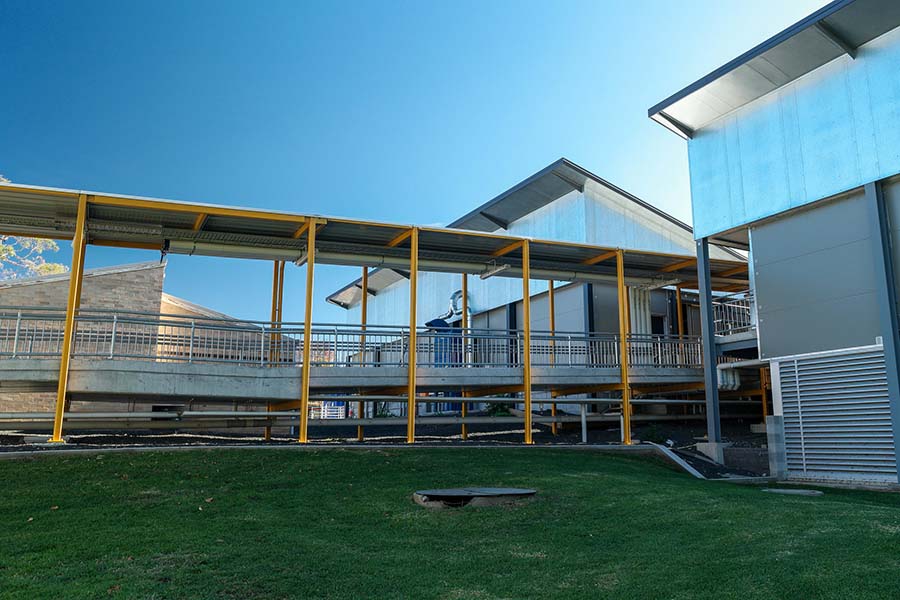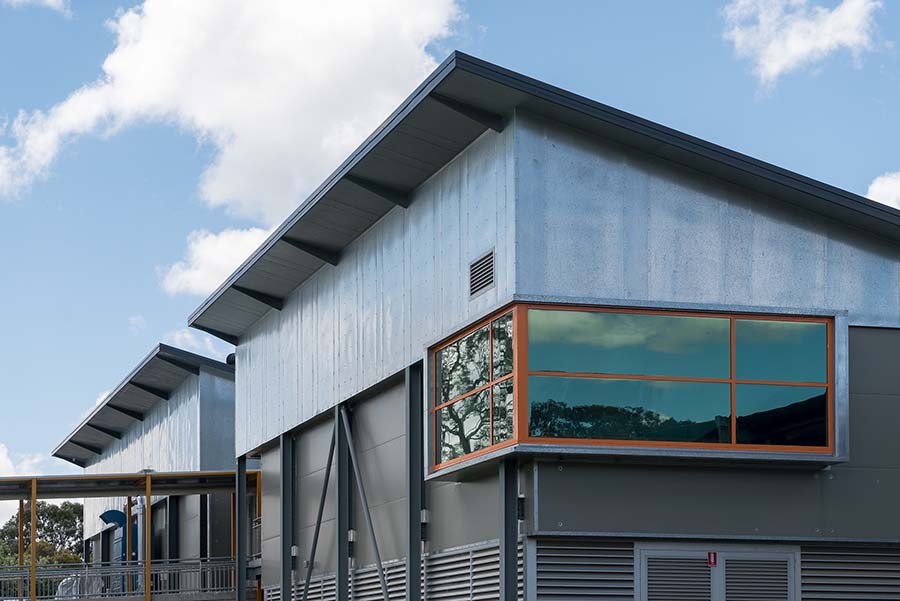Bookings & Facilities
The UNE is uniquely placed to undertake animal research and teaching activities. In addition to the off-campus SMART farms which have excellent facilities for grazing sheep, cattle and feedlot cattle at a commercial scale, the UNE houses a unique complex of facilities known as the Centre for Animal Research and Teaching.
Our Facilities
The Centre has a number of state-of-the-art integrated animal housing and handling facilities with allied laboratories dedicated to research and teaching. These are located within the CART precinct on the UNE Armidale campus as well as on two of the UNE SMART Farms, and they are supported by a team of skilled technical staff.
Animals that can be accommodated include cattle, sheep, goats, poultry, laboratory animals, pigs, wildlife, horses and dogs. All animal research conducted within the CART is overseen by the UNE Animal Ethics Committee and the UNE Veterinarian and Animal Welfare officer, and the animals and facilities are regularly monitored to ensure welfare standards are maintained at the highest level.
The research facilities include a fully equipped feed mill, surgery, recovery room, post-mortem room, climate-controlled rooms, laboratories, sample preparation areas, freezers, cool rooms, office space, student breakout area, and tea room.
In addition, specialised equipment such as a CT scanner, scanning electron microscopes, blood/gas analyser, and net energy chambers are available within the precinct. As such, the Centre is able to support a wide variety of research interests with a current emphasis on animal production, welfare, nutrition, parasitology, biomedical research, and specific diseases of livestock and poultry.

This facility was constructed in 2012 and can house up to 50 cattle in individual pens indoors, with up to another 40 held in group feedlot pens outdoors. In addition, this facility boasts the largest respiration chamber capacity in the southern hemisphere with ten large respiration chambers which are fully automated and allow highly accurate measurements of gas exchange to be conducted, including methane, ammonia and carbon dioxide. The facility includes two research laboratories and a feed storage area. All animals can be handled within the shed via raceways, a cattle crush, weigh bars and a loading ramp. A laneway from the facility provides access to 4 grazing paddocks that can hold up to 10 animals, as well as direct access to the Trevenna paddocks and UNE SMART farms. This large slatted floor facility can hold up to 250 sheep, goats or calves for research and teaching in individual pens along with eight large group pens. This facility also offers individual metabolic crates allowing net energy evaluations to be carried out. A large rodent-proof feed store (accessible by forklift) and extensive preparation area complete the inside of this facility. Outside, there is a loading ramp and set of handling yards for sorting and holding animals. These yards also connect to W074 (multi-function animal facility) via a race to W02B. This is the newest building in the CART, completed in early 2019. It can accommodate poultry, sheep, goats, pigs or calves under climate-controlled conditions. The multi-purpose space can be subdivided into quarters or halves (or a combination) with independent control of air conditioning, ventilation, drainage and lighting provided to each subdivision. The facility also includes two research laboratories and is connected via a race to W012. This facility accommodates intensive poultry experiments, small ruminant metabolic studies, wildlife studies, and the rodent colony (mice and rats). There are ten individual climate-controlled rooms, all with a temperature range of 10-50oC, allowing for precise replication of commercial practices for intensively farmed animals, provision of ideal environments for rodents and wildlife, or research into the effect of environmental extremes in climate-change trials. The rooms can be set up with cameras for remote viewing in animal welfare and behaviour trials. This facility also houses 24 highly sophisticated poultry calorimeters for net energy studies, and 20 small ruminant metabolic chambers which allow for measurement of methane, carbon dioxide, and ammonia gas outputs. This state-of-the-art facility commissioned in 2015 includes a teaching wet laboratory with wall mounted TV monitors suitable for up to 60 students, a preparation room, a 6 table post-mortem area, a fully functioning veterinary surgery (with viewing window) which allows recovery surgery to be performed under general anaesthesia, a 12 pen recovery area, and a walk-in freezer and walk-in cold room. The facility is connected via a race to W012. This building, commissioned in 2014, contains the CART staff offices and shared office space available for researchers. The building has an entry foyer where all visitors must sign in and a meeting room which is used for inductions, training and pre-commencement meetings to discuss experiments with researchers. W071 houses the school’s visualisation laboratory which has a new scanning electron microscope, a bench top SEM, a 3D camera and computer, XRF spectrometer, XRD, a critical point dryer, carbon and sputter coater, a blood gas analyser, and facilities to prepare the samples. A CT scanner and control room which connect to animal holding yards, as well as a cold room for meat samples and a general store room complete the facility. Commissioned in 2015, this facility houses a large feed mill that can mix and pellet special formulation diets at a rate of up to three tonnes per hour, with or without steam pelleting. The facility also boasts a 500kg mixer, a 300kg mixer, a small mill that can pellet at 100 kg per hour, and a large roller mill. Within the mill room there is equipment for bagging special diets and pallet racking that holds up to 20 pallets. The facility has a preparation room and two 8-tonne external silos with internal delivery for bulk grain storage and handling. Delivery of goods is via the road that runs between W070 and W002; goods can be unloaded or delivered with a forklift that can access all areas of the CART precinct. There is a dedicated shed (W010A) for storage of bulk feed ingredients and prepared diets, as well as a cool storage facility. This is a comfortable new area that staff and students can access to prepare and eat meals, or to have a break and relax during intensive sampling programs. There are male and female toilets, change rooms and showers, as well as accessible amenities, and 48 individual lockers for storage of work clothes and PPE. This area also includes a laundry room with a washing machine and dryer. A number of facilities suitable for large-scale poultry studies on the UNE SMART Farms. These are: This facility is a Physical Containment Level 2 (PC2) microbiological laboratory, and certified by the Office of the Gene Technology Regulator (OGTR) as a PC2 Animal Containment Facility. Boasting 24 positive pressure isolators, research into vaccination, genetically modified organisms, and infectious diseases is able to be conducted at this facility. This modern climate-controlled facility located at Laureldale offers large indoor runs, as well as separate outdoor runs and exercise and play areas. This facility allows for controlled studies in canine behaviour, training and nutrition to take place. Research is non-invasive, using privately-owned dogs. The facility is fully functional independently, with dry and cool storage, a food preparation area, laundry facilities, and staff amenities. Research is non-invasive, using privately-owned dogs. Some of the current research focuses on scent detector dogs utilised for quarantine and wildlife conservation.
This facility is located at Kirby SMART Farm with three poultry sheds. The main shed is divided into 4 rooms with programmable temperature, ventilation and lighting control suitable for large-scale nutrition studies, animal welfare studies, or replicated pen studies using up to 50 small pens. Two older style sheds are suitable for layer floor pen trials. The facility has a storage and preparation room for sampling days, back-up generator power and toilet facilities. The location makes it ideal for studies where isolation is advantageous.

For research facility bookings, please contact the CART Director as soon as you have a confirmed experimental start date, or at any time to see current availability. The CART Director will schedule a pre-trial meeting between CART staff and researchers at the time of booking to discuss experiment requirements in terms of facility set up, feed ordering and mixing, animals, biosecurity, staff, consumables, equipment and training requirements. For all technical support requests related to research, please contact the CART Director. The earlier the request the easier it will be to ensure that you get the support that you need. Once you have a confirmed start date, it should be possible, in most circumstances, to schedule all or the majority of experimental technical support based on the protocol. For some experiments, there will be a need for additional technical support from within discipline or project-funded casuals. Bookings for the teaching facilities (W002B wet laboratory, post-mortem room, surgery, or recovery room) must be completed through UNE General Room Bookings. Please contact the CART Director once your booking is confirmed. Bookings for teaching-related technical support from the CART staff must be completed through an ERS Technical Services Request Form. Please send this form to erstech@une.edu.au (please cc. the CART Director). A list of the current fees for use of CART facilities can be found here.Bookings (UNE login required)

